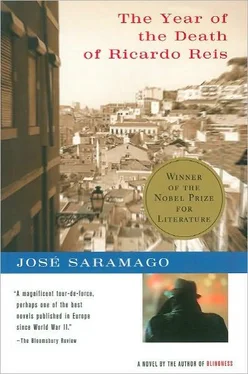José Saramago - Year of the Death of Ricardo Reis
Здесь есть возможность читать онлайн «José Saramago - Year of the Death of Ricardo Reis» весь текст электронной книги совершенно бесплатно (целиком полную версию без сокращений). В некоторых случаях можно слушать аудио, скачать через торрент в формате fb2 и присутствует краткое содержание. Год выпуска: 1992, ISBN: 1992, Издательство: Houghton Mifflin Harcourt, Жанр: Современная проза, на английском языке. Описание произведения, (предисловие) а так же отзывы посетителей доступны на портале библиотеки ЛибКат.
- Название:Year of the Death of Ricardo Reis
- Автор:
- Издательство:Houghton Mifflin Harcourt
- Жанр:
- Год:1992
- ISBN:9780547546926
- Рейтинг книги:4 / 5. Голосов: 1
-
Избранное:Добавить в избранное
- Отзывы:
-
Ваша оценка:
- 80
- 1
- 2
- 3
- 4
- 5
Year of the Death of Ricardo Reis: краткое содержание, описание и аннотация
Предлагаем к чтению аннотацию, описание, краткое содержание или предисловие (зависит от того, что написал сам автор книги «Year of the Death of Ricardo Reis»). Если вы не нашли необходимую информацию о книге — напишите в комментариях, мы постараемся отыскать её.
Year of the Death of Ricardo Reis — читать онлайн бесплатно полную книгу (весь текст) целиком
Ниже представлен текст книги, разбитый по страницам. Система сохранения места последней прочитанной страницы, позволяет с удобством читать онлайн бесплатно книгу «Year of the Death of Ricardo Reis», без необходимости каждый раз заново искать на чём Вы остановились. Поставьте закладку, и сможете в любой момент перейти на страницу, на которой закончили чтение.
Интервал:
Закладка:
The lights dim, the auditorium is in darkness, the loud knocks ascribed to Molière can be heard onstage, what terror they must strike in the hearts of the fishermen and their wives, perhaps they imagine them to be the last-minute hammerings of carpenters on the set. The curtain opens, a woman is lighting a fire, it is still night, from behind the scenery a man's voice can be heard, calling Mané Zé, Ah, Mané Zé, the play has started. The audience sighs, wavers, sometimes smiles, becomes excited as the first act ends with that great stampede of women, and when the lights go up, faces are animated, a good sign. There is shouting overhead, people calling from box to box, one could mistake those fishermen for the actors themselves, their way of speaking almost the same, whether better or worse depending on the measure of comparison. Reflecting on this, Ricardo Reis decides that the purpose of an is not imitation, that the author has made a serious error of judgment by writing the play in the dialect of Nazaré, or in what he supposed was the dialect of Nazaré, because reality does not tolerate its reflection, rather, it rejects it. Only a different reality, whatever it is, may be substituted for the reality one wishes to convey. The difference between them mutually demonstrates, explains, and measures them, reality as the invention it was, invention as the reality it will be. Ricardo Reis thinks these things with even greater confusion, it is difficult, after all, to think and clap one's hands at the same time. The audience applauds, and he joins in out of sympathy, for despite the use of dialect, grotesque as spoken by the actors, he is enjoying the play. Marcenda is not clapping, she cannot, but she is smiling. Most of the women remain seated, it's the men who need to stretch and exercise their legs, to pay a visit to the gents', to smoke a cigarette or cigar, exchange views with their friends, greet acquaintances, to see and be seen in the foyer. If they remain in their seats, it is generally for reasons of love and courtship. As they stand up, their eyes rove like those of hawks, they are the protagonists of their own drama, actors who perform during the intermission while the real actors back in their dressing rooms discard roles they will shortly resume. As he gets up, Ricardo Reis looks between the heads and sees that Doctor Sampaio is also getting up. Refusing with a nod, Marcenda remains seated. Her father, already on his feet, places his hand affectionately on her shoulder, then moves toward the aisle. Hurrying, Ricardo Reis reaches the foyer first. Shortly they will meet face to face, amid all these people who are walking up and down and conversing in an atmosphere soon thick with tobacco smoke. There are voices and commentaries, Palmira is splendid, In my opinion they've put far too many fishing nets on the stage, What a bunch of harpies, grappling with each other, you'd think they were in earnest, That's because you've never seen them, dear fellow, as I've seen them in Nazaré, there they fight like the Furies, At times it is difficult to make out what they're saying, Well that's how they talk there. Ricardo Reis moved among the groups, as attentive to their words as if he himself were the author of the play, while watching the movements of Doctor Sampaio from a distance, anxious that they should bump into each other as if by chance. Then he realized that Doctor Sampaio had spotted him, was heading his way, and was the first to speak, Good evening, how are you enjoying the play then. Ricardo Reis felt no need to say, What a surprise, what a coincidence, he immediately reciprocated the greeting, assured him that he was enjoying the play, and added, We are staying at the same hotel. Even so he ought to introduce himself, My name is Ricardo Reis. He hesitated, wondering whether he should add, I'm a doctor of medicine, I was living in Rio de Janeiro, I've been back in Lisbon less than a month. Doctor Sampaio barely listened, smiling, as if to say, If you knew Salvador as long as I have, you would realize that he has told me everything about you, and knowing him as well as I do, I guess he has told you about me and my daughter. Doctor Sampaio is undoubtedly shrewd, many years of experience as a notary bring certain advantages, We need hardly introduce ourselves, said Ricardo Reis. That's right. They went on almost immediately to discuss the play and the actors, treating each other with the utmost respect, Doctor Reis, Doctor Sampaio. A pleasant sense of equality is conferred upon them by their titles, and so they remained until the warning bell rang, when they returned to the auditorium together, and said, See you soon. Each went to his seat, Ricardo Reis, the first to sit down, kept watching, saw him speak to his daughter. She looked back, gave him a smile, he returned her smile, the second act was about to begin.
All three of them met during the next intermission. Even though they knew all about each other, they still had to be introduced, Ricardo Reis, Marcenda Sampaio. It was inevitable, the moment they both awaited, they shook hands, right hand with right hand, her left hand hanging limp, trying to fade from sight, shy, as if nonexistent. Marcenda's eyes shone brightly, she was clearly moved by the sufferings of Maria Bern, perhaps there was a deep reason in her personal life for accompanying, word for word, that final speech made by the wife of Lavagante, If there is a hell, it can be no worse than this, Virgin Mother of the Seven Sorrows. Marcenda would have made this speech in the dialect of Coimbra, but speaking in a different dialect in no way changes these feelings which cannot be explained in words, I fully understand why you do not touch this arm, you who share the same hotel corridor, man of my curiosity, I am she who hailed you with a lifeless hand, don't ask me why, I haven't even asked myself that question, I simply hailed you, one day I will learn what prompted that gesture, or perhaps not, now you will withdraw rather than give me the impression that you are being indiscreet, inquisitive, taking advantage, as one would say, go, I will know where to find you, or you me, for you have not come here by chance. Ricardo Reis did not remain in the foyer but wandered in the aisles behind the boxes on the grand tier and peered up at the boxes overhead to get a closer look at the fishermen. But the warning bell started ringing, this second intermission was shorter, and when he reached the auditorium the lights were already beginning to dim. During the whole of the third act he divided his attention between the stage and Marcenda, who never once looked behind her. But she had slightly altered the position of her body so that he could see a little more of her face, a mere glimpse, and from, time to time she drew back her hair on the left side with her right hand, very slowly, as if on purpose. What does this girl want, who is she, because people are not always what they seem. He saw her dry her cheeks as Lianor confesses that she stole the key of the life jacket so that Lavagante would die, and again when Maria Bern and Rosa, the one beginning, the other concluding, declare that this was an act of love and that love, being a noble sentiment, turns to torment when it is frustrated, and finally in the brief closing scene when Lavagante and Maria Bern are about to be united in the flesh. Suddenly the lights went up, the curtain fell to wild applause, and Marcenda was still drying her tears, now with a handkerchief. She was not alone, weeping women could be seen everywhere in the auditorium. Nervously smiling, the actors, such sensitive souls, acknowledged the ovation, made gestures as if returning it to the upper boxes occupied by the real heroes of these tales of love and adventure at sea. All inhibitions forgotten, the audience looked up in their direction, this is the communion of art, and applauded the intrepid fishermen and their courageous womenfolk. Even Ricardo Reis is clapping. Here in this theater one sees how easily understanding can be created between different classes and professions, between the rich, the poor, and those in-between, let us savor this rare spectacle of fraternity. The fishermen are now being coaxed to join the actors on the stage, the dragging of chairs can be heard once more. The performance is not over yet, the audience sits down. Now comes the climax, such merriment, such animation, such rejoicing, as the fishing community of Nazaré comes down the center aisle and climbs onto the stage. There they dance and sing the traditional airs of their region along with the actors, a night to be recorded forever in the annals of the Casa de Garrett. The leader of the group embraces the actor Robles Monteiro, the oldest of the fishwives receives a kiss from the actress Palmira Bastos, they all talk at once, utter bedlam, each speaking in his own dialect but managing to understand the others nonetheless, then there is more singing and dancing. The younger actresses demonstrate the traditional folk dance of Minho until the ushers finally start pushing us gently toward the exits. A dinner is to be served on stage, a communal love festival for the actors and their muses, corks will pop from the bottles of that sparkling wine which stings one's nostrils, the good women of Nazaré will be in fits of laughter once their heads start spinning, unaccustomed as they are to sparkling wine. Tomorrow, when the bus departs in the presence of journalists, photographers, and leaders of the corporations, the fishermen will give loud cheers for the New State and the Fatherland. One cannot be certain if they were paid to do so, but let us assume it is a spontaneous expression of gratitude at having been promised that port they so earnestly desire. If Paris was worth a mass, perhaps a few cheers will gain them salvation.
Читать дальшеИнтервал:
Закладка:
Похожие книги на «Year of the Death of Ricardo Reis»
Представляем Вашему вниманию похожие книги на «Year of the Death of Ricardo Reis» списком для выбора. Мы отобрали схожую по названию и смыслу литературу в надежде предоставить читателям больше вариантов отыскать новые, интересные, ещё непрочитанные произведения.
Обсуждение, отзывы о книге «Year of the Death of Ricardo Reis» и просто собственные мнения читателей. Оставьте ваши комментарии, напишите, что Вы думаете о произведении, его смысле или главных героях. Укажите что конкретно понравилось, а что нет, и почему Вы так считаете.












